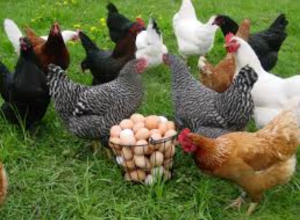According to archaeological findings, bird farming (otherwise known as poultry farming/business) began roughly 7,500 years ago in ancient China. And no, it did not begin with the domestic chicken. Which brings us to the question, WHAT IS POULTRY in the first instance? What value can we derive from poultry farming? We shall be looking into the poultry business in Nigeria, the requirements and cost.


Indeed, we shall examine which birds are suitable for poultry business in Nigeria, checked side by side with buyers’ preferences.
What is Poultry?
The term POULTRY refers to several species of domesticated birds that are reared by people. They are valued for their eggs, meat and even feathers. These domesticated birds are often referred to as ‘domestic fowls’ – the commonest of them being the chicken. Global statistics show that there are probably over 33 billion chickens reared worldwide as we speak. Other commonly reared poultry include ducks, geese, guinea fowl, pigeons, turkey, peafowl, quail, mute swan, partridge, pheasant, emu, and ostrich.
What Value Can We Derive from Poultry Business in Nigeria?
One of the healthiest and tastiest varieties of animal protein available are meat and eggs from poultry. The excellent taste of both eggs and poultry meat in some bird species has endeared them to consumers. After beef and goat meat, poultry meat is the third most consumed meat in Nigeria at 300 million tonnes per year. While 650 million tonnes of eggs per year is equally consumed in the country.
We are not ignoring the fact that eggs are nutritious and can be bought cheaper than meat; thus the demand for eggs is enormous. We also acknowledge that poultry meat and eggs are quite easy to digest compared to other forms of meat.
It is on record that poultry meat contains plenty of protein, vitamin B complex, several minerals, and healthy monounsaturated fats. And speaking of eggs, they are a rich source of vitamins (B complex, A, D, E), zinc, phosphorus, iron, selenium, omega-3 fatty acids and choline. Which makes poultry meat and eggs highly nutritious additives to our daily meal intake.
Additionally, biogas (for cooking) and manure (for boosting crop farming) can be generated from poultry waste. Yet again, the bones and eggshells from poultry are known to be useful additives in animal feeds. Finally, some varieties of domesticated fowl such as emu and ostrich are reared for their feathers as well.
It goes without saying that poultry farmers in Nigeria can profit hugely from this business with careful planning and monitoring.
Requirements to Set Up Poultry Business in Nigeria
You need to have a plan in order to set up poultry business in Nigeria (or elsewhere for that matter). The basic requirements to look out for when setting up a poultry farm include the following:
Choose Which Specie of Bird/fowl You Wish to Rear.
Consumers/buyers’ preferences would be quite important here, so you need to investigate what birds are mostly consumed in your part of the country. The most consumed poultry type in Nigeria (and globally) remains chicken followed closely by turkey. In places like Northern Nigeria, guinea fowl are quite popular because they feed primarily on wheat, sorghum, and millet. These are foods commonly grown in that region.
Besides that, you must also choose what breed(s) of the target bird you wish to invest in. If for instance you prefer to raise chickens, do you want broilers or layers? Broilers are reared for their meat, and they could be males or females. While layers are females reared for both their eggs and meat. Accordingly, their required feeds are also different from one another – plan towards that as well.
Also Read- 10 Businesses You Can Start With 5k in Nigeria
Find Out the Cost of Materials and Equipment to Decide on a Budget
How big do you want your farm to be, and can you afford it? It is always a great idea to start small; then later upgrade the operations and equipment as your farm grows bigger. But before doing that, check the cost of obtaining the equipment and materials. That should include:
- the land area needed,
- the appropriate housing,
- the poultry feeds with the right nutritional composition,
- the equipment,
- drugs and disease control, and
- veterinary services.
It is quite possible to start a small-scale poultry farm with something between N50,000 and N100,000.
Choose a Good Farm Location
As a small-scale farmer, it might be convenient to start by using the available space in your living environment for your poultry. One or two chicken cages may just suffice for a start. But we are all well aware of the odour that comes from a poultry house. It is recommended that you choose a more suitable location far away from living residences, as the farm expands.
Consider also the necessity of clean water supply; as well as a clean and safe environment for your birds. Ensure the farm is close enough to easily accessible and clean water. If you can afford to drill a borehole on the farm, the better. The environment should also be protected from pests, pollution, and possible predators (such as snakes or rodents).
Set up an Appropriate Shelter/Housing for Your Poultry
There are four basic types of poultry shelter or housing in Nigeria. Check their descriptions below. Whichever you choose, ensure it is safe and at least moderately comfortable for your birds.
- Free-Range Housing: This is a very common method of poultry farming, and by far the oldest known method. The birds are allowed to roam freely, moving randomly around the farm land to seek for food until nightfall. Then they are driven into a temporary shelter at night. The shelter is typically a small housing or cage on stilts/poles. However, the danger of this system comes from constant exposure of the birds to bad weather, predators, unclean food and more ills.
- Semi-Intensive system: This form of poultry housing is a combination of free-range and intensive system. A small land area surrounded with wire mesh (called a ‘run’) is built very close to the poultry house. This allows the birds to roam freely in the run during the day and peck on their meals. At night, they are driven into their poultry house.
- Folding unit System: This is a smaller version of the semi-intensive housing system. It comprises both a run and a poultry house connected together, but requiring less space. It is small and portable enough to be moved from one location to another.
- Intensive system – This is the best and obviously the most expensive housing system for poultry. It is extremely suitable for large-scale poultry farming. Here, the birds are entirely kept in well-constructed houses; and their movements are further limited. By doing so, the birds are much safer and conserve more energy. It further makes it easier to monitor everything regarding their feeding, drug administration, selective breeding, quarantine of sick birds, and more. The productivity level of this type of poultry housing is higher and more guaranteed. But as said earlier, it is more expensive to set up and maintain.
Map Out How to Feed and Cater For your Birds
Your poultry birds would need plenty of attention when it comes to proper care. They need warmth, quality food, and clean water on a daily basis. Regular cleaning of the cage, vaccination, and medication will also be necessary. Pay close attention to the nutritional composition of their feeds. Soybeans and maize are quite commonly fed to poultry, because they have just enough nutrition to satisfy the birds.
However, you will find a range of fortified feeds such as fish oil, concentrates, balancers, and more. These feeds are usually in three general forms: mash, pellets, and crumble.
Have a Marketing Plan for Your Poultry Farm Products
Since the ultimate aim of setting up your poultry farm is to make profit, it is important to invest well in marketing your products. Consider the fact that maintaining a poultry farm is quite expensive. So you need to gather knowledge from far and wide about the poultry business.
Also, you must plan well and in advance on how to market your products using every available channel. This should include approaching neighbors, friends, and relatives for a start. Further reach out to potential buyers through social media, e-commerce websites, local vendors, supermarkets, restaurants, hotels, eateries, caterers, and more.
For large-scale producers, it would be a good idea to employ marketers, and invest in home delivery services. Running special offers and discounts from time to time may also attract more buyers. And finally, gather every available resource, and focus on success.
Poultry Business in Nigeria: What Equipment are Required?
The basic equipment needed by every large-scale poultry farmer are listed below with brief descriptions. However, if you are starting on a small scale, you obviously do not need to buy them all at once.
- Incubators: An incubator is a machine used to safely hatch poultry eggs. This is achieved by keeping the eggs warm at a specific temperature and controlled humidity. It generally takes about 21 days to hatch a chicken egg. Incubators come in various sizes. They have the added advantage of helping to mass-produce hatched eggs.
- Brooders: A brooder is a device used to provide warmth for chicks. When chicks are exposed to cold temperatures, their digestive and immune systems become weakened and they easily fall sick. This slows down their growth. To reverse this, brooders are set to an optimum temperature to keep the chicks warm and safe.
- Battery cages: A cage is the basic housing structure built for poultry. They are built in different sizes out of wood or iron. The cage you will use will depend on the size and type of birds that will use it. Battery cages for chicken broilers arẹ built different from that of layers for instance.
- Transport crates: These are containers or boxes used to carry the birds from one location to another.
- Feeders and Drinkers: Feeders are the containers used to hold the feed while the birds eat out of them. On the other hand, drinkers are used to provide the birds with clean drinking water. There are nipple drinkers and bell drinkers.
- Debeaking machine: A special machine for shortening the length of a bird’s beak, for special reasons.
- Egg crates: These are containers used for safe transporting and storing of eggs taken from a poultry.
- Vaccination equipment: These are special equipment used to dispense medicine and/or vaccines to poultry. They include special sprayers and injectors.
- Poultry processing machines: There are various machines used in the hygienic processing of poultry. They include different machines for defeathering, for slaughtering, for cutting, and for neat packaging of poultry.
Poultry Business in Nigeria: The Risks Involved
Setting up a poultry farm comes with many risk factors which you must watch out for. This will help you to seek the necessary help ahead of time, and avoid huge losses. They include:
- Poultry feeds tend to be expensive
- Poor access to, and high cost of veterinary services is a challenge
- Lack of (or not enough) government and/or extension support services
- Possibility of receiving low-quality chicks
- High mortality rates (due to fast-spreading disease, and pest attacks)
- Insufficient technical knowledge
- Obtaining agricultural loans may not be easy
Poultry Business in Nigeria: Available Farm Support Services
There are organizations and support groups available for you as a poultry farmer in Nigeria. Such organizations offer programs, advice, mentorship, funding, and other necessary assistance to new and growing farmers in the poultry business. You can reach out to them online and physically. Some of these support organizations include:








